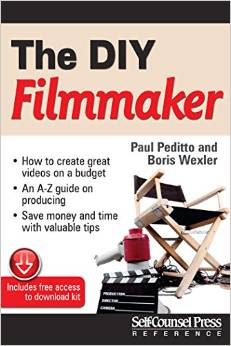 I’ve lost track of the number of years nofilmschool has made my Top 5 list of best sites. The irony is it’s not strictly even a screenwriting website. Being as I teach at Columbia College I’ve always been a bit queasy when discussing the necessity of Film School. There is knowledge scattered all over the internet for free. There are great new cameras and software, some of them already built into your computer. If I were 18 and considering the issue I would be thinking long and hard about taking on a lifetime of debt for that sheepskin. Does anyone really care what the Grade Point Average Spike Lee or Marty Scorsese had? The only defense is you get to make LOTS of movies in fim school, you practice the craft. You also can network, meeting people you might work with the rest of your life. Why else would people pay 50K to go to UCLA, USC or NYU? It’s called access to the Country Club.
I’ve lost track of the number of years nofilmschool has made my Top 5 list of best sites. The irony is it’s not strictly even a screenwriting website. Being as I teach at Columbia College I’ve always been a bit queasy when discussing the necessity of Film School. There is knowledge scattered all over the internet for free. There are great new cameras and software, some of them already built into your computer. If I were 18 and considering the issue I would be thinking long and hard about taking on a lifetime of debt for that sheepskin. Does anyone really care what the Grade Point Average Spike Lee or Marty Scorsese had? The only defense is you get to make LOTS of movies in fim school, you practice the craft. You also can network, meeting people you might work with the rest of your life. Why else would people pay 50K to go to UCLA, USC or NYU? It’s called access to the Country Club.
Thing is, the learning out there for free at a website like nofilmschool is just awesome. The scope of what’s featured on this site isn’t just screenwriting. There’s enlightening articles on all aspects of filmmaking, from pre-production, production, and post.
Check out the site. Here’s a taste of some articles:
- HOW VR COULD CHANGE THE FILM INDUSTRY
So we’ve got what, two senses — sight and sound– fully in Virtual Reality mode? What happens when they bring in smell, taste, and the big one–touch? Time to invest in the porn industry, which, this article suggests, has always lead the way in terms of technology.
“According to Damon Brown, author of Porn & Pong: How Grand Theft Auto, Tomb Raider and other Sexy Games Changed Our Culture, “It seems so obvious: If we invent a machine, the first thing we are going to do—after making a profit—is use it to watch porn. When the projector was invented roughly a century ago, the first movies were not of damsels in distress tied to train tracks or Charlie Chaplin-style slapsticks; they were stilted porn shorts called stag films. VHS became the dominant standard for VCRs largely because Sony wouldn’t allow pornographers to use Betamax; the movie industry followed porn’s lead.”
- 12 TIPS FOR BUDGETING AN INDEPENDENT FEATURE
This is an excellent article giving 12 Indispensable Tips for Budgeting an Independent Feature. Rule 5 reminds me of the story my brother told about a mutiny that occurred on the set of Light And The Sufferer. End of a 15 hour day and the crew was presented a cold meal of some sort. There was a wailing and gnashing of teeth from the crew that was already underpaid and overworked. My brother, directing that movie, recognized that people will BOLT if you don’t feed them well. He ran to a local McDonalds for 25 Eggs McMuffins and the insurrection was quelled. So yeah, feed your people well!
“5. Make sure no one is hungry
As an addendum to the previous item: once you’ve hired a great crew, keep them happy! A happy crew will be energized and motivated to make your movie happen. And everyone knows the best way to keep a crew happy is with good food. That means no pizza. It’s worth noting that healthy, substantial, and varied craft services not have to be expensive, if done creatively. Your (great) UPM should know all about that.”
- CHARACTER INTRODUCTIONS
Here’s one for screenwriters, 10 strategies for how to introduce a character. These two strike me especially:
“6. Invite the audience into the character’s world
How does your character walk? How does she talk? How does she see the world? Make the audience see the world through your character’s eyes. Make them feel the way she feels. You want them to believe in this perception of his own reality, even if it is far different than the actual reality of the rest of her world.
5. Introduce the fatal flaw as soon as possible
Overwhelm the audience with your character’s flaws from the get-go so they are able to follow the stages of his journey, whether tragic or heroic, that will lead to the resolution of his character—and, ultimately, the film.”
- HOW TO PULL OFF CONVINCING ACTION SEQUENCE ON A BUDGET
This article gets that while you shouldn’t try to be Tarantino without a Tarantino budget, if you absolutely need that action sequence to tell the story, there are steps to take to make it look as good as possible. Here’s a sample:
“Decide how and when to compromise.
Accept and come to terms with the fact that your vision may likely get scaled back, especially on an independent film. Learn how to compromise and make every moment count. If you go in with unrealistic expectations, then you’re only going to be frustrated with yourself and the end result. It’s also going to prevent you from moving past what you’re married to.
Always try to prioritize your “popcorn moments” ahead of time. Once the story beats of your action scene have been solidified, ask yourself if there are any opportunities to up the ante. This may already be story related or it might be gag related. Make sure to pepper these throughout the film. If you know that you’re going to be limited by budget, find exciting and engaging ways to switch things up. Whether it’s a shootout or a fight scene, find those special moments that count.”
- NOBODY CARES ABOUT YOUR MOVIE–HERE’S WHY YOU SHOULD STILL MAKE IT
I just like their spirit, the relentless optimism of nofilmschool. Look at this article which gives you a rather grim portrait of how much “product” there is in the film marketplace right now. How the hell you gonna get noticed without a major star? Why put years into this thing when nobody will probably see it and it’s unlikely you’ll even make your money back? Well…read this article and find some strength, Good Reader!
“How does it feel to know that after all the time, effort, and money you spend crafting a film, you might be the only one who truly believes in it?
Though it’s not the positive, inspirational message we all want to hear, it’s true: nobody really cares about your work. It’s not because it’s bad or because people are mean and out to get you; it’s because we live in a time where the over-saturation of media causes the audience to have exceptionally discriminating tastes. In the past, when only a few dozen films would hit theaters (and there weren’t a whole lot of leisure activities to choose from), being picky wasn’t a luxury most audiences could afford. Now that the internet and digital filmmaking has democratized cinema, the influx of content is too much for anybody to keep up with, so viewers become increasingly selective…”


